|
 
COVER STORY | IN
THE NEWS | ARTBEAT
TALK OF THE
TABLE | THE HUM | CALENDAR
May 25, 2006

The Gallegos mystique v. The Dikeman critique
story and photos by HANK SIMS
IF YOU KNOW SOMEONE who
cares deeply about the race for Humboldt County district attorney
(and it would be shocking if you didn't) you know one thing:
The other guy and all his people are lowdown disreputable types
who should be run out immediately. Different people pick a different
villain, but the rhetoric is much the same on either side. In
today's political climate, there's precious little room for middle
ground, or even for reasoned debate.
In most areas, the question of who leads the band
of attorneys that prosecutes crime on behalf of the public does
not lead to blood feuds. People elsewhere may pause slightly
longer over their sample ballots when choosing a DA than they
do when choosing a county clerk-recorder, but not much longer.
Here it's different — less like a meeting of the Kiwanis, more
like a battle to the death. Why? Whether you credit him or blame
him, it's because of Paul Gallegos.
Gallegos, a former defense attorney, took over
as DA in 2003, after having beaten 20-year incumbent Terry Farmer
the year previous. He promptly filed a massive lawsuit against
the Pacific Lumber Company that had been brought to him by the
Humboldt Watershed Council, an environmental group. The lawsuit
alleged that the company had committed fraud during the lead-up
to a public buyout of the Headwaters Forest, obtaining though
deceit the right to log much more on its remaining lands than
it otherwise would have. Timber supporters instantly announced
their intent to recall Gallegos from office; Pacific Lumber itself
eventually backed the effort to the tune of several hundred thousand
dollars. In March of 2004, after a bitter campaign, Gallegos
beat back the recall handily, getting a 61 percent "No"
vote.
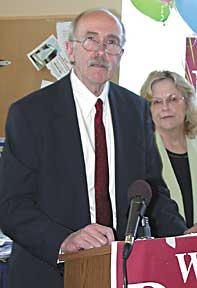 Since
then, Gallegos has become a powerful symbol for Humboldt County
residents of all sorts — forest activists, '70s-era "New
Settlers," marijuana decriminalization advocates, recent
refugees from suburban America — who have long felt powerless,
at least outside the Arcata city limits. Gallegos' defeat of
the recall seemed to many to signify that their moment had arrived,
that Humboldt County had finally turned a corner. The timber
companies, the gravel miners, the ranchers and the rest of the
good old boys that had run the county for 150 years were no longer
in the driver's seat. Since
then, Gallegos has become a powerful symbol for Humboldt County
residents of all sorts — forest activists, '70s-era "New
Settlers," marijuana decriminalization advocates, recent
refugees from suburban America — who have long felt powerless,
at least outside the Arcata city limits. Gallegos' defeat of
the recall seemed to many to signify that their moment had arrived,
that Humboldt County had finally turned a corner. The timber
companies, the gravel miners, the ranchers and the rest of the
good old boys that had run the county for 150 years were no longer
in the driver's seat.
Worth Dikeman (left).
Just a few years earlier, sworn law enforcement
officers had swabbed pepper spray directly into the eyes of young,
non-violent timber activists, causing them to writhe in pain.
The footage hit the evening news, making Humboldt County a sick
joke in the national press. With the coming of the new progressive
majority, as evidenced by Gallegos recall's wide margin of defeat,
that sort of thing wouldn't happen any longer, it was thought.
The county's politics and government — especially its law enforcement
apparatus — would reflect the forward-looking culture that had
been brewing here since the hippie days. We would be able to
join the 21st century.
There's no doubt that much of the feverish support
Gallegos inspires today stems directly from the fact that he
stood down Pacific Lumber at the ballot box. (He hasn't fared
so well in court: The office's suit against the company was thrown
out last year before making it to trial, with the DA office's
chosen judge in the matter deciding that it betrayed a misunderstanding
of the law. Gallegos notified the appellate courts of his intent
to appeal the decision shortly afterwards, but as yet no briefs
have been submitted.) He also devised liberal guidelines for
the use and cultivation of marijuana by people who obtain a medical
prescription for it, guidelines later officially adopted by the
county Board of Supervisors. And in the wake of last month's
police shooting of Eureka resident Cheri Moore, and of the California
Highway Patrol's recent heavy-handed responses to two peace marches
down Highway 101 earlier this year, many are encouraged by Gallegos'
touting of his "independence" from the police, who
overwhelmingly support his opponent, veteran prosecutor Worth
Dikeman, who has worked in the office over 20 years.
But in this, as in all things to do with the district
attorney race — which will be decided a week and a half from
now, on Tuesday, June 6 — the most vocal representatives of
the Gallegos camp aren't so much arguing with Dikemanites about
this as they are talking past them. Gallegos supporters speak
of equal justice, civil rights, of first principals handed down
to us by the Founding Fathers. Dikeman supporters, meanwhile,
want to see someone more interested in just doing the damned
job, in all its mundane particulars.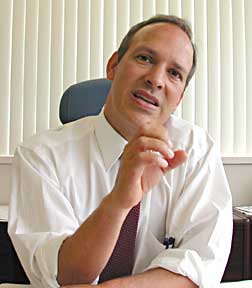
Right: Paul Gallegos
In 2005, after a year-long
investigation, the Humboldt County Grand Jury released a
scathing indictment of Gallegos' management of the district attorney's
office. "Implicit in all evidence gathered by the Grand
Jury — including interviews with the DA — is the unfortunate
truth that the DA exhibits a limited understanding of how things
are done in the department," it read. "The district
attorney has failed to educate himself thoroughly in office operations
and procedures ... he does not meet regularly with the supervisors
who oversee his staff; he does not meet regularly with deputy
district attorneys; he does not meet regularly with law enforcement
agencies ... he has no written training documents for new hires."
The district attorney is in the first place an
administrator, responsible for managing the work of prosecutors,
investigators and support staff. In the past four years, members
of the office have been unwilling to speak to the press or the
public — partly, they say, out of a sense of professional conduct
and partly out of fear of reprisal. In recent weeks, though,
several staff members have come forward on the condition that
their names not be used. (The Journal agreed to the condition.)
The picture they paint, uniformly, echoes the Grand Jury report
in every particular: ineffectual leadership, Gallegos' absence
from the day-to-day work of the office and a chaotic workplace
in which good case preparation — the bread-and-butter of legal
work — is made impossible.
"Paul is a nice person," said one. "He's
pleasant to be around during the day. But he's not a district
attorney." Said another: "He's got good ideas, but
no follow-through."
In particular, the members of the office interviewed
fault a laissez-faire management style for the exodus of experienced
attorneys from the office, a phenomenon also noted by the Grand
Jury. When Gallegos first took office in January 2003, he released
two attorneys — Harry Kassakhian and Gloria Albin Sheets —
and hired Mendocino County prosecutor Tim Stoen as Assistant
District Attorney. But Stoen spent almost all his energies on
the Pacific Lumber case, leaving the rest of the office to absorb
the day-to-day caseload. Meanwhile, as other prosecutors began
to leave, their positions were filled with green attorneys straight
out of law school, and according to members of the office interviewed,
those new attorneys were given very little in the way of guidance
or on-the-job training. Many of them have also moved on, and
recruiting for their replacements has been slow. At least two
open prosecutor positions are currently unfilled.
What happens, according to the first staff member
quoted above, is that long-term members of the clerical staff
end up guiding the new recruits in their transformation from
law-school students to prosecutors.
"Clerical is not supposed to train the attorneys,
but that's what happens," the staff member said. "The
vets, they're in the courtrooms — they're busy up to here."
Underlying the poor organization and management
of the office, they say, is the feeling of job insecurity felt
by the deputy prosecutors. Gallegos, in his initial run for the
office, had pledged to institute civil service protections for
deputy prosecutors, so that they could not be fired unless the
boss could show good cause. He abandoned that pledge shortly
after taking office. Now, according to staff members interviewed,
deputies feel they have to keep their mouth shut and their heads
down if they want to keep their jobs — no protests about working
conditions, or about the priorities of the office (which one
staff member described as "Just get something" — just
get some sort of penalty in plea-bargain arrangements, so long
as it goes down as a win).
Another staff member interviewed said that the
patience and good will of the office as a whole was just about
worn out.
"We're still giving him everything we can,
but it doesn't feel like a two-way street," the staff member
said. All staff members interviewed were certain that despite
Gallegos' statements to the contrary, the overwhelming majority
of the office — from the lowest file clerk all the way on up
— supported Dikeman.
Despite his ire at
the futility of Gallegos' Pacific Lumber case, and despite his
view that his current boss is beholden to his political supporters
far more than the people of the state of California, the dissolution
of the office, as laid out by the staff members above, seems
to be the thing that most irks Worth Dikeman.
Dikeman is almost frustratingly calm and patient
in his answers to questions. People who know him testify that
he is the warmest of human beings, but in conversation with strangers
he seems loath to let much of his personality slip out. Sixty
years old, possessing a bright bald gray-fringed dome and an
unfashionable mustache, Dikeman exudes natural reserve. He's
not cold, he's just inhumanely polite.
He first entered politics during the recall attempt
against Gallegos, as a potential "replacement candidate"
if the recall were successful. He did so after Steven Schectman,
an Arcata defense attorney and Gallegos ally, threw his own hat
into the ring, as a "safety" candidate in case the
recall were to succeed. A little over a year after the recall
failed, Dikeman announced that he would seek to replace Gallegos
in the upcoming election. But he denies the story current among
Gallegos supporters, that he and the office veterans had it out
for Gallegos from the start.
"He deserved our loyalty," he said. "He
deserved the opportunity to grow into the position. I think everyone
was prepared to give him a fair shot. But he's not done a good
job. He's done a poor job."
Dikeman says that what convinced him that he had
to run — "or that someone had to run, would be a better
way of putting it" — was Gallegos' firing of Deputy District
Attorney Allison Jackson, a 10-year veteran prosecutor, in 2004
(see "Forged documents and six pounds of weed," May
18). To Dikeman's way of thinking, it was unforgivable to summarily
dismiss an experienced and dedicated prosecutor who'd never had
a blot on her personnel record. And what her firing did to the
office was just as bad, in its way, he said.
Jackson was one of the two attorneys who worked
with the Child Abuse Services Team, a highly lauded program that
uses a number of resources — attorneys, investigators, social
workers — to investigate and prosecute cases of molestation.
Her loss was symptomatic of Gallegos' neglect of CAST, Dikeman
said. Previously, the office had two prosecutors who regularly
worked with the program; now there is only one — Maggie Fleming.
Everyone agrees that Fleming is highly capable, but she is a
part-time employee and CAST is but one of her many duties. Dikeman
said that restoring CAST to its previous level would be his first
priority. He said he would reassign current Deputy DA Andrew
Isaac — who, along with Jackson, used to work CAST for many
years — to the child abuse beat.
In general, he said, he would seek to restore order
and confidence to the running of the office. He would bring back
"vertical prosecution," in which the same prosecutor
follows a case from its conception to its end. And he would do
two things to assure that the office could keep and recruit people:
He would establish the civil service protections that Gallegos
once promised, and he would build a sensible mentoring system
to help young attorneys grow into their jobs. As it stands, he
said, the young attorneys in the office are too often left helpless.
As an example, he cited the way petty theft crimes
end up being prosecuted in the office. Petty theft is no one's
idea of a top priority in an office that prosecutes some 7,000
cases a year, he said, so it makes sense to get plea bargains
from defendants in order to save time and money. But there is
a catch: In agreeing to a plea bargain, a prosecutor is wise
to get at least some jail time as part of the sentence on paper.
(In practice, the amount of time can be waived in exchange for
time served at the defendants arrest). Unless jail time is part
of the sentence, a prosecutor cannot seek increased punishment
in the case of repeat offenders. Young attorneys are unaware
of this loophole, he said, and these days they don't often seek
it.
Dikeman says that in this and other instances,
he's not accusing Gallegos of purposefully making it easy on
criminals.
"I'm not Oliver Stone, so I don't see conspiracies
everywhere," he said. "I think it's poor support that's
allowed these things to occur."
For Gallegos, his reelection
fight against Dikeman has been merely a replay of
the recall. The lack of Pacific Lumber money — and the rapidly
declining power of Pacific Lumber in the county — makes no real
difference.
"This is the same battle," he says. "And
these same people are trying to mislead the people, again. And
I stress, again."
Gallegos, 44, is handsome, well-dressed and well-spoken.
Unlike his opponent, he is not a man of few words — though he
is famous for the long, awkward pauses that sometimes punctuate
his conversations, he nearly always emerges from them with a
decently formed sentence. He is relentlessly, aggressively on-message,
and will find a way to tell you what he thinks you should hear
without discarding entirely the point of your question.
The "misleading" he refers to is the
charge that he has weakened the CAST program through neglect.
During the recall, he was heavily criticized for getting only
a 16-year sentence for a suspect that had serially abused his
daughter, when he could conceivably have gone for a much larger
sentence. Gallegos thinks that in both cases, the charges against
him are underhanded and insulting — why would he do anything
to weaken the prosecution of child abuse in the county, he asks?
He himself is a parent of three, he says, and besides, it would
be politically suicidal to go easy on child molesters. His devotion
to CAST was apparent, he said, as he had assigned Fleming —
possibly his best attorney — to it.
As far as Dikeman's example concerning the prosecution
of petty theft cases is concerned, Gallegos said he had never
heard about such a thing happening in the office. He hadn't known
that the law was structured like that. But he said that if such
a problem did exist, it would be something that he would be able
to remedy very easily.
"That's one great thing about the way our
office is structured — we can effect change relatively fast,"
he said. "It's a really responsive setup. If there's a problem
I can take it to our people and say 'This is what's going on,
this is where we're screwing up, let's fix it.' This is the first
I've heard of it, but if it's true, it's totally fixable."
Gallegos argues that this de-centered approach
to management — "a 21st century approach," as he called
it during one of his debates with Dikeman — is ideally oriented
toward on office of professionals, in which no one should expect
to have their hand held every step of the way. Young attorneys
should grow into their jobs, to make their own way and learn
to use their own judgment in cases.
Gallegos' main plank in this campaign is that since
he has been in office, violent crime has fallen to record lows.
(The low occurred in 2003, the first year Gallegos took office.
In 2004, the last year for which the California Department of
Justice has figures, it rose slightly.) Why would the community
want to change horses in the face of such record achievement,
he wonders? Why give in to the scare tactics used by the other
side?
"This community is not in danger — far from
it," he says. "They're saying the streets aren't safe?
They haven't been safer in 15 years."
And though that's the main thing Gallegos wants
voters to hear this time around, he also wants them to remember
the man they supported in such overwhelming numbers during the
recall. He wants them to think of the man who had the guts to
take on Pacific Lumber.
"The world's changed," Gallegos says.
"Certainly, it means the district attorney's office is an
independent office. It acts independently, it is independent
and it represents the people of this community. Not certain sections
of this community, not just individuals in this community, but
the community as a whole."
'T' Time
Backers, detractors weigh in on anti-corporation initiative
story and photos by HELEN SANDERSON
Listening to Fortuna
attorney Robert Zigler speak to a crowd of mostly white-haired
women at the Red Lion Inn in Eureka last Friday, it was clear
that the debate over the passage of Measure T was getting ugly.
Zigler seemed genuinely flabbergasted as he told
the Eureka Republican Women at the luncheon to "be afraid"
of Measure T, the ballot initiative that seeks to ban outside
corporate spending — read: Wal-Mart, Maxxam — in Humboldt County
elections. From his point of view, Measure T restricts a corporation's
constitutional right to free speech and therefore would never
survive a costly legal challenge.
To anyone who has been paying attention to the
ongoing debate over Measure T, Zigler's protestations were nothing
new. Even the same lingo — "power grab," "disenfranchise,"
"personal agenda" — popped up repeatedly. What's changed
is that what started as a nonpartisan duel has steadily become
just that: right versus left, conservative versus progressive,
old guard versus new. Add Humboldt's pre-eminent Republican millionaire
philanthropist to the mix and the division seems to get wider,
prompting warring politicos to take the gloves off.
 "It's
fascist," Zigler said. "I totally agree with Rob Arkley"
(the owner of Eureka-based Security National and the Eureka
Reporter). Arkley was not at the luncheon, but in
publicized letters to local elected officials he urged the county
to strike down Measure T or risk facing a costly lawsuit challenging
its constitutionality. "It's
fascist," Zigler said. "I totally agree with Rob Arkley"
(the owner of Eureka-based Security National and the Eureka
Reporter). Arkley was not at the luncheon, but in
publicized letters to local elected officials he urged the county
to strike down Measure T or risk facing a costly lawsuit challenging
its constitutionality.
Right: "NOT" Website urges a no vote.
Zigler went on to paint Democracy Unlimited of
Humboldt County — the parent of the Humboldt Coalition for Community
Rights, which authored the ordinance — as a group of left-wing
radicals not even originally from Humboldt County, with a single-minded
goal of subverting corporate personhood. He quoted heavily from
the group's website, as well as 28-year-old DUHC member Ryan
Emenaker's "MySpaces" (sic) account, and spared no
harsh words for Measure T's 26-year-old Campaign Manager, Kaitlin
Sopoci-Belknap.
"Know your enemy," he urged the 40 or
so Republican women. "Know who's on the other side of you."
BACK UP OFF US. The
impetus for Measure T — aka "The Ordinance to Protect Our
Rights to Fair Elections and Local Democracy" — was born
of the failed recall attempt of District Attorney Paul Gallegos
in 2003-04.
In response to a fraud lawsuit Gallegos filed against
Maxxam Corp. — Pacific Lumber's Texas-based corporate parent
— the company spent more than $300,000 to get the recall on
the ballot and promote it. Gallegos volunteers, many from Democracy
Unlimited, worked around the clock to keep the DA in office and
later crafted the ordinance to keep such a corporate-funded drive
from hijacking elections again. According to Sopoci-Belknap,
about 60 people had input on the ordinance, the result of approximately
six months of work.
In the draft process the group researched past
election expenditures to find out how many businesses and unions
contributed to political campaigns.
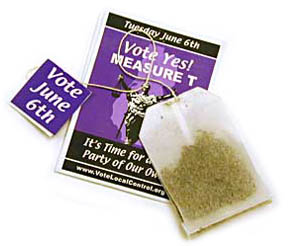 "We
looked at ... the recall campaign, we looked at one of the supervisors
races — kind of the bigger races," Sopoci-Belknap said.
"There really weren't many business contributions."
She said that most small business owners appeared to be giving
as individuals. "We
looked at ... the recall campaign, we looked at one of the supervisors
races — kind of the bigger races," Sopoci-Belknap said.
"There really weren't many business contributions."
She said that most small business owners appeared to be giving
as individuals.
Left: Yes on 'T' campaign tea bag.
And that's the thing. Under T, individuals local
and non-local — that means Rob Arkley and Charles Hurwitz —
will still be allowed to throw money at Humboldt County elections.
That doesn't necessarily mean they will do so, Sopoci-Belknap
said."There are greedy people who have agendas," she
said, "but I would think that Charles Hurwitz is not going
to spend $100,000 of his own money in a local election here."
Nonlocal nonprofits wouldn't be allowed to contribute
to campaigns, either. That includes Sopoci-Belknap's employer,
Democracy Unlimited. By the narrow definition of Measure T, which
states that headquarters, all employees and shareholders must
be in Humboldt County, DUHC is not "local" because
it's a project of a California nonprofit.
A major source of contention between Yes and No
factions is the involvement of unions in campaign contributions.
The way Measure T is drafted, unions — as long as they have
local members — can contribute. So, for example, if the local
chapter of the California Nurses Association wants to give money
to a local campaign, they can. Meanwhile, St. Joseph Hospital,
an Orange County-based nonprofit, cannot contribute.
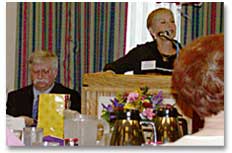 Crawford
thinks that's bogus. Sopoci-Belknap says unions are meant to
protect employees' rights, not like a corporation that tries
to protect its investments. Their union fees entitle them the
right to give a specified amount of money to political campaigns.
She also asserts that most unions give very little, generally
only a few hundred dollars per campaign. Crawford
thinks that's bogus. Sopoci-Belknap says unions are meant to
protect employees' rights, not like a corporation that tries
to protect its investments. Their union fees entitle them the
right to give a specified amount of money to political campaigns.
She also asserts that most unions give very little, generally
only a few hundred dollars per campaign.
Right: Robert Zigler (seated) and Nancy Flemming
address a Eureka Republican Women's luncheon.
WHO'S AFRAID OF MEASURE
T? No on Measure T (NOT) Campaign Manager Chris Crawford
won't concede to fearing Measure T. "I'm not afraid of anything,"
he said. "I'm just affronted." He claims Measure T
is "farcical on its face."
The beefy 53-year-old business owner with the blond
wavy hair can talk a good game, and certainly comes off as authoritative
— intimidating, even — but his record is not as commanding.
Crawford ran unsuccessfully for Humboldt County Supervisor in
2000 and was campaign manager for Rex Bohn, who lost in 2004's
race against incumbent Chris Kerrigan for Eureka City Council.
Currently, he is the spokesman for the Humboldt
Business Council, a 501(c)4 "dedicated to job growth and
job-friendly regulations on the North Coast." Purported
members include timber companies among other large businesses,
though Crawford would not divulge the group's membership.
According to its website, the recently formed Humboldt
Business Council has taken favorable positions on permitting
for Evergreen Pulp, Balloon Track development and the Hampton
Suites project on the Eureka waterfront.
Thought it would appear that the Humboldt Business
Council and Democracy Unlimited are at opposite ends of the advocacy
spectrum, Crawford maintains that No on T has a broad demographic
of support.
"You can tell just by some of the endorsements
and some of the people participating in this that this isn't
just some wacko right wing knee-jerk reaction to [Measure T],"
he said. Notables on the endorsements page include former
Palco CEO and current Fortuna Mayor John Campbell, 2nd District
Supervisor Roger Rodoni, the Eureka Reporter, the
Humboldt Sentinel, the Eureka Greens, the Republican Party
of Humboldt County and the Libertarian Party of Humboldt County.
Another exception Crawford takes to Yes on T's
campaign is that the measure's supporters are not adhering to
their own principles in that they have raised campaign funds
from nonlocal entities — $7,600, at last count.
"This is a fundamental attack on our basic
democratic principles," Crawford said. "It's cloaked
as campaign finance reform, which is what most people want."
Crawford and NOT are among them, advocating for
"true" campaign finance reform in the form of a $500
limit for political campaign contributions. They've already imposed
the donation cap on their own campaign fundraising.
"I think it would solve all of these problems
if there was a $500 cap," he went on. "But, you know,
the devil is always in the details of these things. I think you
would have to get together various stakeholder groups and come
up with some language and some questions to resolve reasonable
accommodations."
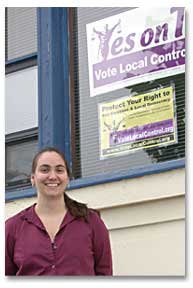 Sopoci-Belknap
said that a $500 limit would compliment Measure T. In her view,
Humboldt County is big enough for both campaign finance reform
initiatives. Sopoci-Belknap
said that a $500 limit would compliment Measure T. In her view,
Humboldt County is big enough for both campaign finance reform
initiatives.
Left: Kaitlin Sopoci-Belknap.
SO SUE ME. A Humboldt
State University graduate student also contributed his thesis
project to the effort, conducting a telephone survey in which
he asked Humboldt County residents about their perception of
corruption in local political campaigns. Seventy-eight percent
of respondents agreed that "when corporations financially
contribute to the electoral process it makes political corruption
more likely."
It's Yes on T's claim that results of the survey,
along with the recall attempt and the Wal-Mart 1999 ballot initiative
to change zoning laws on the Eureka waterfront, is enough evidence
to prove that the citizenry in Humboldt County believes the local
democratic process is undermined by corporate advocacy. Yes on
T supporters believe this means it is within the county's legal
rights to impose an initiative such as Measure T. The only way
to test their claim is through a legal challenge.
If Measure T passes, and a legal challenge is launched,
the county could possibly spend a great deal of money defending
it. (Crawford made it clear that he will not be launching any
lawsuits: "I spent my life working in courts, and I know
not to go there.")
But Yes on T says that lots of initiatives are
threatened with a legal challenge when they're on the ballot,
just like Proposition 215 was, and the threat of a lawsuit is
no reason to back out. Besides, supporters have been offered
pro bono legal aid from attorney John Bonifaz, a Democrat who
is currently seeking to become secretary of state in Massachusetts.
Bonifaz, a confident speaker with a head of thick
brown hair that would rival any Kennedy's, has visited Eureka
to speak about the legal standing of Measure T. At a forum in
April he made a case for the ordinance.
He explained that the 1978 Supreme Court case First
National Bank of Boston v. Belotti stemmed from a situation
similar to that of Measure T, where a ballot initiative was passed
to bar corporate spending in elections. The initiative was challenged
in court and was found to be unconstitutional. But, in a later
opinion, Judge William Rehnquist explained that the court overturned
the Massachusetts initiative because there was no evidence to
prove that the electoral process was distorted, nor that citizen
confidence in elections was diminished. In essence, Bonifaz argues
that Measure T meets that test because Humboldt County can prove
its elections have been negatively influenced by corporations.
Belknap and Yes on T supporters see Measure T as
in-step with the fight for civil rights. They liken it to the
end of racial segregation and the emancipation of women. They
also delight in the coincidence that their ordinance was assigned
the letter "T," and draw parallels to the Boston Tea
Party, the legendary act of civil disobedience in which B-towners
messed with parliament and the British East India Company, one
of the largest corporations in the world at that time, sparking
the Revolutionary War.
Meanwhile, Crawford's assertion remains that too
much money is spent on elections and a financial cap would solve
the county's election woes. He cited the example of Bohn's race
against incumbent Chris Kerrigan in 2004, in which local businessman
Bill Pierson contributed over $20,000 to finance Bohn's (and
Crawford's) opponent. "It's ridiculous," he yelled
into the phone, "for a $500 a month city council [seat]
to cost $85,000!"
AMPLIFIED SPEECH. That
is a point where both sides agree. But the Humboldt Coalition
for Commu-nity Rights would frame it another way, and say that
money is not speech, money is an amplifier to speech. The more
money you have the more you get to talk to the public, and the
most money pumped into elections has historically come from big
businesses.
John Bonifaz contends that while corporations have
the First Amendment right to free speech, they do not have the
right to drown out other people's voices.
"The right to vote is far more than the right
to simply pull that lever on election day," he said. "It's
the right to an equal and meaningful vote, and that includes
equal and meaningful participation in the entire election process
— not just on election day."
TOP
COVER STORY | IN
THE NEWS | ARTBEAT
TALK OF THE
TABLE | THE HUM | CALENDAR
Comments? Write a
letter!

© Copyright 2006, North Coast Journal,
Inc.
|